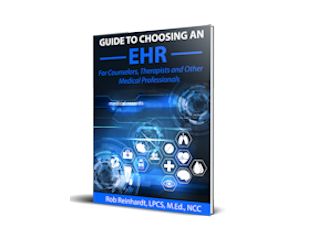More Than Just a Free Newsletter
Become a Tame Your Practice member for FREE and receive our newsletter, special offers, and exclusive members-only content.
EMR vs. EHR Redux
Last year, as part of my series on Cloud-Based Practice Management Systems, I briefly discussed the terms EMR, EHR, and Practice Management System. While the information in that article remains accurate, it’s important to note that a clearer distinction between Electronic Medical Record (EMR) and Electronic Health Record (EHR) has taken hold here in the United States. The driving forces behind that clarification are the Centers for Medicare & Medicaid Services (CMS) and the Office of the National Coordinator for Health Information Technology (ONC). As part of the Meaningful Use program, they have created a clear distinction between EMR and EHR. The key word in this distinction is interoperability.
According to CMS and ONC, an EMR is the digital version of a patient’s paper chart. The benefits it can provide include the ability to:
- Track data over time
- Easily identify which patients are due for preventive screenings or checkups
- Check how their patients are doing on certain parameters—such as blood pressure readings or vaccinations
- Monitor and improve overall quality of care within the practice
What an EHR adds is interoperabilty, or the ability for practitioners, offices and even patients to easily share and access that information. EHRs have the potential to greatly enhance coordination of care by providing each healthcare provider with instant information about a patient’s health history. The ONC states that the benefits include:
- The information gathered by the primary care provider tells the emergency department clinician about the patient’s life threatening allergy, so that care can be adjusted appropriately, even if the patient is unconscious.
- A patient can log on to his own record and see the trend of the lab results over the last year, which can help motivate him to take his medications and keep up with the lifestyle changes that have improved the numbers.
- The lab results run last week are already in the record to tell the specialist what she needs to know without running duplicate tests.
- The clinician’s notes from the patient’s hospital stay can help inform the discharge instructions and follow-up care and enable the patient to move from one care setting to another more smoothly.
This could directly help behavioral health professionals by informing them of things like client allergies and medical conditions.
The reason these defitions have gained such traction is because of the Meaningful Use program and its goal of encouraging use of an EHR by all healthcare providers. As noted in my previous article, Psychiatrists are currently the only behavioral health care providers that are Eligible Professionals in the Meaningful Use program. Only they are affected by the EHR requirement in acheiving Meaningful Use. It is possible that other behavioral health care professionals will be included in the mandate in the future, but as of this writing, there is no requirement for behavioral health clincians (apart from Psychiatrists) to use an EHR.
A note with regard to the Cloud-Based Practice Management Systems (EHR/EMRs) I’ve reviewed. Some of them include an EHR, while some of them do not. Remember that an EHR is the collection of records regarding patients and the ability to easily share that information electronically with other providers. If you’re needing an EHR to be part of your CBPMS, be sure to ask your vendor if they are certified for Meaningful Use and how they have acheived interoperability.
Get the Complete Guide
Get fully informed and understand all of the implications of your EHR selection in the Guide to Choosing an EHR. In this book, Rob goes into detail and provides a step by step process for selecting the best fit EHR for your practice.
Related News
Similar articles you might be interested in!
Tame Your Practice Free Membership
Tame Your Practice membership is free and provides therapists access to exclusive content, discounts, and deals from partners!
Recommended Technology, Tools, and Resources for Therapists and Counselors
Recommendations for technology, web sites, secure email, phone, credit card processing, therapy tools/interventions, podcasts, and much more!
Health Information Exchanges (HIE) and How They May Affect Your Practice
Health Information Exchanges (HIE) are an initiative related to the Affordable Care Act and the HITECH Act. Their purpose is to ease the communication between the EHR/systems of various providers of health care, because the EHRs themselves are behind in doing so (i.e. interoperability).
About the Author
Rob has been covering technology and business news for mental health professionals since 2011. His extensive experience in IT, business, and private practice allow him to synthesize information in a friendly, digestible manner. He also enjoys time with his family, ultimate frisbee, and board gaming.





